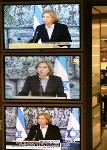Index relies entirely on the support of donors and readers to do its work.
Help us keep amplifying censored voices today.
I really don’t understand this. At all.
Is the BBC’s quest for balance actually distorting its coverage of Israel’s military campaign in Gaza? Index on Censorship Chief Executive John Kampfner thinks it might be:
‘Language, as any propagandist knows, is the most important tool. Hamas fighters are called “militants”. That, I am told, is a halfway house between “terrorist” and more sympathetic labels such as “guerrillas”. The Israeli army is often referred to by its formal title, the Israel Defence Forces. The bombardment of Gaza has regularly been described as “the Israeli operation”. Such language denudes coverage of impact.’
Read the rest at Media Guardian
 Coverage of events in the Gaza Strip by the Israeli media has rarely transcended propaganda, writes Dimi Reider
Coverage of events in the Gaza Strip by the Israeli media has rarely transcended propaganda, writes Dimi Reider
(more…)
 Frustration is growing over Israel’s refusal to allow journalists into the Gaza Strip. Padraig Reidy reports
Frustration is growing over Israel’s refusal to allow journalists into the Gaza Strip. Padraig Reidy reports
(more…)